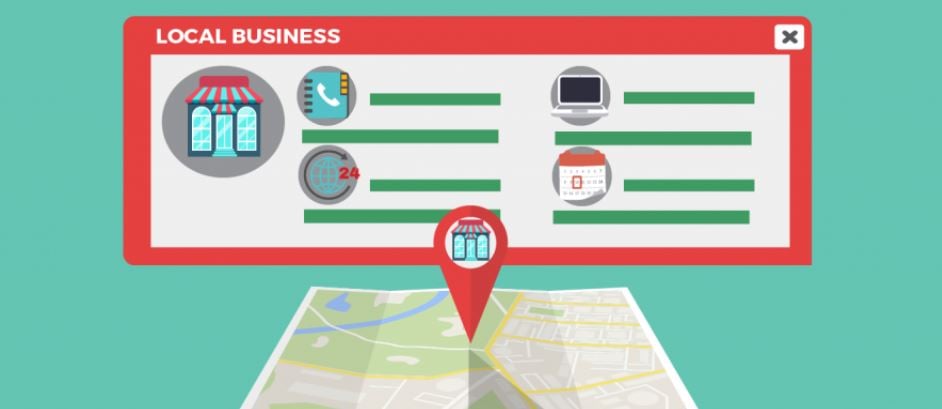Ah, the internet. The digital phonebook of the 21st Century. If you’re trying to find a business, product, or service in your area, all you have to do is hit up your favorite search engine and type your query. For consumers, it’s easy to find exactly what you’re looking for, both where and when you’re looking for it.
For local businesses, it’s another matter entirely. A matter of getting your business found by those searching consumers, so that you can make sales and grow your business. Ensuring your online business listings are accurate and complete are the most important way of doing so.

Whether a consumer is hungry, or needs a new do, accurate business listings make sure they find what they need.
What’s An Online Business Listing?
A business listing is a public profile that contains a business’ vital information such as name, address, number, website, hours of operation, and more. They act as a “virtual doorway” to local businesses, and can (and should) be found across hundreds of online listings and directory sites across the web. Some directories are vertical-specific, though many (like Google+, Yelp, Yellow Pages, and so on) are generic catch-all’s for all businesses.
Who Needs Online Business Listing?
Everyone! Local businesses need listings in order to be found, and consumers need listings to find products and services they’re looking for! Any local business that wants to be found online needs business listings. Your business may even already have them, whether they realize it or not.
How Local Is Local?
The term “local business” does not necessarily refer only to small and medium sized businesses, but can also include multi-location or national companies that have a presence in local markets. When the word local is used, we’re talking about businesses being searched for or found in their area by nearby consumers.
When consumers hit the keyboard to find a business or product/service, they’re more likely to spend their dollars in the local area. Why take a road trip just to get a haircut, or pay online shipping fees when a local boutique has what you need?
Listings For Local SEO
If you want to rank well in local search, you need consistent NAP data, website, hours, and more across all major listing directories. This is essential for search engines to validate them as a credible local business.
The more accurate and consistent data there is about the business across the web, the more search engines will trust the validity of the business. And the more the search engines trust the business, the higher they will rank in local SERPs (Search Engine Results Page).
According to Moz in their 2017 Local Search Ranking Factors survey, 13% of professionals list citation signals as the most important element in Local Pack Ranking factor.

What’s In An Online Business Listing?
The information contained in business listings can vary across verticals and directories—but some key pieces of information hold true across them all.

NAP Data
The most crucial data held in a business listing is the NAP data—name, address, and phone number information. NAP data for online business listings is critical for the online visibility of any business, and every listing source contains this information for the businesses listed. Having correct NAP data ensures that not only will consumers find your business online, but they will also have accurate, up-to-date information on how to contact you.
NAP data is also important for search engines like Google to display your client’s business in geo-targeted searches. If someone is searching “good seafood” in the Boston area, the local Boston seafood places with correct NAP data will appear. Of course Google gives search ranking priority to business with correct NAP data—how else are they supposed to tell where you are, what you do, and if you’re even a legitimate business at all?
The Stats
Consumers are looking for your client’s business! What exactly are they looking for?
- 53% of mobile searchers are looking for directions
- 50% are looking for business addresses
Think with Google
Despite the importance of accurate data for NAP for Online Business Listings, our data shows that many businesses are failing even at this basic step into the world of listings.
- 86% of businesses have either missing or incorrect company name information listed across all listings sources
- 72% of businesses have either missing or incorrect address information listed across all listings sources
- 71% of businesses have either missing or incorrect phone number information listed across all listings sources

”Are businesses napping on accurate NAP data? 86% of #localbusinesses have an incorrectly listed name!” quote=”Are businesses napping on accurate NAP data? 86% of #localbusinesses have an incorrectly listed name!”]Are businesses napping on the importance of accurate NAP data? 86% of local businesses have either missing or incorrect company name information!
Hours Of Operation
One of the most important details about your client’s business to include besides NAP data is the hours of operation. When a consumer is searching for their business (or their goods/services), they have a high purchase intent, and are likely searching for an immediate need.
The consumer will likely a visit a business after the business is shown as “open” on their Google search.

If your business has no hours listed, the consumer would have to go out of their way to find out whether they’re open or closed from their website, or a phone call. Or, worse yet, they drive to visit the business and find that they’re closed. Now they’re not only inconvenienced by not knowing your client’s business hours, but they’re also upset for wasting their time. Let the negative reviews commence!
If your competitor has their business hours listed, they’ll likely capture that consumer. People just want their needs fulfilled—they’d be happy to spend their money at a business that has their hours correctly listed if they were coming in-store to make the purchase.
The Stats
- 73% of purchases that result from mobile searches happen within the same day, and most (63%) within a few hours
- 76% of consumers report that they expected hours of operation information when conducting a search
- Over 60% of consumers find that knowing the business hours helps them make their purchase decision
Localeze, 2015
Consumers are often looking to make purchases the same day that they’re searching, so make sure they know your client’s store is open when they go looking!
Websites
Does your business have a central “hub” of information to direct users to online? Throw that website link into their business listings. Consumers will often travel from Google search into a business website to get a feel for the business, and learn more about what they’re offering. So obviously, including a link to your client’s website is important for their online presence.
The Stats
- 93% of businesses have either missing or incorrect website information listed across all listings sources
- Only 7% of businesses have their website information correct across all listing sources
- Nearly half of small businesses don’t have a website (Clutch)

If a user can find the website, they’ll get a better impression of their business. This usually results in a more positive experience. Make sure you stand out on the SERP by including their website data in the listing information.
Other Listing Information To Include
Depending on your client’s business, there might be other important information to include in their online business listings.
- Payment methods
- Services
- Brands
- Holiday hours
- Photos
- Social profiles
- And more!
Include as much information across all listing sources and directories. This will make it easier for your clients to find you and purchase your products and/or services.






